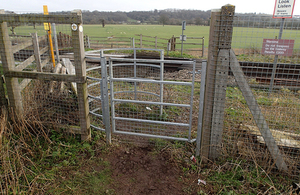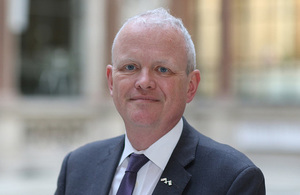Five companies working across the UK have been awarded up to £80,000 to develop innovative digital solutions to tackle the challenge of tracking waste from its source through its treatment and final disposal.
The UK generates more than 200 million tonnes of waste a year with individual waste transactions estimated at above 20 million. However, the subsequent transport and disposal of this waste can be complicated and at times fragmented.
In November 2017, the Cabinet Office announced a £20m Innovate UK fund to encourage tech firms to deliver innovative solutions to public sector challenges, like the improvement of waste tracking and action against waste crime.
Government wants to know more about how this waste is generated, handled, and disposed of in the UK. By helping UK regulators take action against waste crime, and spot opportunities for companies to join up their waste operations, this will help to maximise the value of waste as a resource, and minimise damage to the environment.
The successful projects include research into tracking waste through electronic chips and sensors, the use of blockchain, looking at common reporting platforms, and new data analytics.
Environment Minister Thérèse Coffey said:
We want to move towards a more circular economy, where waste is valued as a resource and reused. We are also committed to cracking down on waste criminals who exploit the system.
Congratulations to the winning projects. I look forward to seeing their innovative waste tracking solutions which will help us to meet these ambitions, and play their part in helping us achieve zero avoidable waste in the UK by 2050.
Minister for Implementation Oliver Dowden said:
The GovTech Catalyst is a great example of collaborative working between the Government and innovative start-ups.
The effective management of waste will help improve the environment and boost this emerging industry, clearly highlighting how our investment in smarter technologies is crucial to tackling public sector challenges.
At the end of a three month feasibility stage, up to two projects may then be selected and funded up to £500,000 each to develop and field test a prototype in a second phase of GovTech Catalyst, expected to open later this year.
The £400,000 funding follows an independent review into serious and organised waste crime commissioned by Environment Secretary Michael Gove last year. The review found that the lack of digital record-keeping in the waste industry is frequently exploited by organised criminals who mislabel waste to avoid landfill tax or illegally export it.
Today’s announcement builds on government’s recently published Resources and Waste Strategy, which sets out government’s intention to clamp-down on illegal movements of waste at home and abroad including by introducing compulsory electronic tracking of waste.
- ‘Blockchain’ is a way of recording data more securely
- ‘Common reporting platforms’ refers to new ways of reporting data in one place
About GovTech Catalyst
- GovTech Catalyst is a £20 million fund to help tech firms deliver innovative solutions to public sector challenges.
- It encourages small, emerging technology businesses to create and develop innovative solutions to public services, that once proven can move to scale both to the advantage of markets and society.
- GovTech Catalyst is run by the GovTech Catalyst team at Government Digital Service with support from Innovate UK.
- Funding for the competition is under SBRI (the Small Business Research Initiative), which aims to bring together government and businesses to find innovative solutions to public sector challenges.
- £250,000 was provided from the GovTech Catalyst fund secured by Defra working with the environment agencies in England, Scotland, Wales and Northern Ireland, with an additional £150,000 provided by Defra. *There were 5 different challenge competitions awarded funding in the first GovTech Catalyst round: Identifying Daesh still imagery; tracking waste through the waste chain; tackling loneliness and rural isolation; cutting traffic congestion, and deploying smart sensors on council vehicles to improve services.
About the winning projects
1. Anthesis: Defra Smart Waste Tracking Project
Anthesis is a global specialist sustainability services and solutions provider; founded on the belief that sustainable business practices are at the heart of long-term commercial success.
Their project will design and test the feasibility of an innovative waste tracking system called ‘Vastum’.
It is expected that the system will reliably and securely record all waste movements in the UK; allowing waste to be effectively tracked to its final destination. The system will provide a powerful tool in helping to protect the environment. It will also make sure that waste producers and managers comply with waste regulations and help regulators identify and take action against illegal waste crime.
The new tracker will also help to bring together the many forms of waste data that are currently being collected into one new system. Anthesis will undertake a feasibility assessment for the waste tracking concept based on a blockchain approach, applying proven technology mainly used in the finance sector. Blockchain securely records transactions into a ‘distributed ledger’ on a time stamp basis. The tracker can be expanded to replace the myriad of existing reporting and compliance data systems used by waste producers, collectors and the regulators.
Importantly, recording waste movements at source by the waste producer, will also address the current data gaps that exist.
See their video for more information about the project.
2. Dsposal
Dsposal is a clean-tech start-up working towards a world where all waste is treated as a resource.
They build easy-to-use tech to connect all waste producers to licensed waste services and make compliance simple. They believe in making the relevant data accessible and convenient to use, driving behaviour change and creating value by maximising the utility of waste.
The KnoWaste project is designed to bring a smart waste solution in two parts. The first is a simple, free to use waste app. This can be used by any person or organisation to deal with their waste correctly. We enable the whole waste job to be handled in the app. From picking a licensed waste company to checking their credentials and paying for the job when it’s been carried out compliantly. Everyone along the waste pathway benefits.
The second part of KnoWaste is the design of an open data standard for waste on which will be built a central database. Using a standard means that we can gather better quality data. Which will help us all meet the ambitions in the Resources and Waste Strategy. This single central database will connect the separate systems currently in use, providing the regulators with the oversight they need and the industry with the insight it requires.
The Dsposal KnoWaste project team is strengthened by working with partner organisations – Open Data Manchester and The University of Bradford, an Ellen MacArthur Foundation ‘Pioneer University’ – to enhance and ground the project.
See their video for more information about the project.
3. International Synergies Limited
International Synergies Limited ISL specialise in resource efficiency methodology, tools and techniques. They are the world leading authority on industrial symbiosis: repurposing one company’s waste or underutilised resources so that it can be used by other organisations. In doing so, reducing organisational costs, increasing profits and, benefiting the environment by reducing carbon emissions and diverting waste from landfill.
The System for Waste Enhancement, Evaluation and Tracking (SWEET) project will demonstrate the feasibility of creating a digital solution that will simplify current data entry processes through big data, machine learning and artificial intelligence (AI).
An adaptation of ISL’s award winning SYNERGie® 4.0 platform, that will:
- record and track individual movements of waste through the economy
- provide an innovative solution to maximise the value extracted from resources
- support the elimination of waste crime through tracking of waste movements in real time
- validate collectors and receivers against registered lists for all sites, and,
- capture the UK incoming/outgoing international waste movements to facilitate audit processes
It will also explore the development of an application programming interface (API) to enable the transfer/sharing of data, as well as financial models for system sustainability.
The team will work alongside Alutrade, Recycled UK and Birmingham City Council, to optimise the potential effectiveness of the project.
See their video for more information about the project.
4. PragmatIC
PragmatIC is a world leader in ultra-low cost flexible electronics; enabling the potential for trillions of smart objects to engage with consumers and their environments.
Their unique technology platform creates flexible integrated circuits (FlexICs) that are thinner than a human hair and can be easily embedded into any surface. These FlexICs provide the opportunity to add new functionality to items, as well as extending proven applications such as radio-frequency identification and near-field communication into mass-market use – cases that were previously prohibited by the cost of traditional silicon ICs.
PragmatIC’s unique FlexICs are ideal for everyday Fast Moving Consumer Goods (FMCG) products. The vision for the future is that they will be applied to products via inlays and labels using standard manufacturing lines, and each individual product will be assigned a unique ID (UID). At the same point during manufacturing, data is attributed to that UID in a database, including: time and place of manufacture, packaging materials, product ingredients and sources.
As the UID stays with the item throughout its life, by tapping on the product at any time the database could be read and the data could be updated if required. For example: the wholesaler or retailer could tap to check authenticity and provenance, plus location data could be added; then when the consumer taps, details of local recycling information specific to the actual item or packaging type could be delivered.
During the Phase 1 project, PragmatIC will demonstrate the concept of attaching FlexICs to products and accessing the data that has been assigned to their unique IDs using low cost readers.
See their video for more information about the project.
5. Topolytics
Topolytics is a smart grid for the world’s waste. It is a data analytics business that is mapping the generation, movement and fate of commercial and industrial waste materials globally. The resulting insights help waste producers and waste processors to maintain this material at its highest utility. Topolytics is a CE100 global circular economy innovator with the Ellen MacArthur Foundation and is recognised by Cleantech Group as one of the leading companies in the emerging ‘wastetech’ sector.
It supports commercial investment decisions around processing, recycling, remanufacturing and other ways of extracting value from waste materials and used assets. It also arms regulators and policy makers with better data, analysis and decision support, ultimately enabling a circular economy at scale.
Topolytics addresses the waste tracking challenge by mapping and analysing the generation, movement and fate of waste materials from waste producers, through the waste value chain to the ultimate destination – whether this be disposal, refuse derived fuel, recycling, re-manufacture or re-use. Given the diverse nature of waste material and sources, their approach to Phase 1 is to work with the Ordnance Survey to analyse household, municipal, commercial, construction and hazardous waste, and build maps of the waste movements system across four areas of the UK, giving us a range of metropolitan, rural and industrial environments.
Their existing experience working with commercial and industrial waste producers has highlighted the significant challenge of data integrity and accuracy, demonstrating that there is no single source of waste ‘truth’ and that the industry has a significant opportunity to be much more data driven. Their approach of building location intelligence into the heart of the UK waste data system, will offer significant benefits to the waste producer and the progressive players in the waste industry.
See their video for more information about the project.

